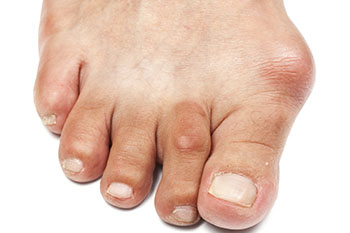
A bunion is a bony, painful swelling that is often formed on the first joint of the big toe. Bunions can be extremely painful due to the weight of all your body resting on it each time you take a step. Everyday activities, such as walking and wearing shoes, can cause you extreme discomfort if you have a bunion.
Reasons that a person may develop a bunion can vary. Some patients may form bunions due to genetic factors, complications with arthritis, or a weak foot structure. General aging can also play a role in the formation of a bunion.
If you have a bunion, you may notice a bony bump on your big toe, experience swelling and redness, and the area may feel tender to the touch. To help alleviate the pain that often comes with having a bunion, it’s suggested to maintain a healthy weight to help lessen the pressure on your toe, practice both heating and icing the affected area, wear wide-fitting shoes wear to leave plenty of space for your toes and to minimize rubbing, and look into shoe inserts that can help position your foot correctly.
Because bunions can result in other painful foot problems, such as hammertoes and bursitis, we recommend that you meet with a podiatrist for a professional diagnosis and for information regarding all your treatment options.
What Is A Bunion?
A bunion, technically called a hallux valgus, is a hard bony round protrusion that extends from the side of the base of the big toe. It can also occur with the little toe when it is known as a bunionette.
It’s a fairly common foot complaint that worsens over time and can cause pain and discomfort, difficulty wearing certain types of shoes, and contribute to other foot disorders. Bunions are caused by a misalignment of the joints of the bones that make up the big toe. If caught in the early stages of development, bunions can be treated with non-invasive measures, but in the more severe stages surgery is the only option.
The All Care Foot Center of Palmdale, CA is highly experienced in the most advanced bunion treatment and care procedures.
What Causes Bunions?
Bunions can develop from a variety of causes and often from several factors working in concert to bring about the abnormal condition. It’s often almost impossible to determine a single cause of a bunion, but some of the main contributing factors are:
-
Heredity
A person’s genetic inheritance can make them predisposed to developing bunions. Heredity is also a factor in flat feet and loose ligaments, both of which can lead to the development of bunions. -
Abnormal Bone Structure
Shortened, missing, or misshapen foot bones, flat arches, and asymmetric leg lengths can cause a bunion to develop, as well as serious injury to the foot that alters foot structure. -
Pregnancy
During pregnancy, a woman’s body releases a hormone called relaxin, which helps to widen the pelvis for birth, and can also cause loose ligaments in the feet which is a possible factor in bunion development. -
Improperly Fitted Shoes
Shoes that force the toes into an unnatural position, such as high heels or shoes with pointed toes, when worn for long periods on a regular basis, can lead to the formation of bunions.
Bunion Treatment
If a bunion is diagnosed early in its development before it begins to cause serious problems for a patient it can usually be treated with non-invasive measures to slowly correct the misalignment of the bone joint such as shoe inserts. If left untreated to the point that a bunion causes the patient regular pain and discomfort and limits normal activity then surgery, called a bunionectomy, is the recommended treatment. It’s the only way to permanently remove the bunion. Fortunately, modern techniques make this type of surgery relatively painless with a fast recovery. Again, early diagnosis and treatment of a bunion are important.
If you suffer from a bunion or other foot problems, schedule an appointment with the All Care Foot Center of Palmdale, CA by calling 661-273-FEET (3338) or contact us online anytime.
